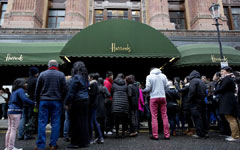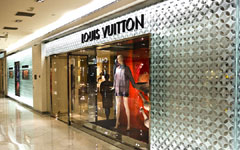The question is: Where is that education going to take place?
"I think the retail experience is probably the primary experience of luxury in China because it's the easiest way with properly trained staff, which is a big issue, by the way, to educate the highly sophisticated consumers - the Chinese mainland consumers, the aspirational consumers who want to move up the food chain and spend money on luxury goods. It's the most direct way to educate the population what luxury is," said Furman.
|
 |
|
 |
|
 |
"The Chinese are a bit touchy-feely," said Sun. "They like to feel and touch an item before they bring it home."
"That's why a lot of brands invested early on aggressively because they realize that the presence is as much 'advertising' as it was a retail business," said Furman. "Many brands were willing to invest even the metrics, meaning the number of the retail performances, was not equivalent to what one would experience in the West. But it's better than advertising."
E-commerce channel
E-commerce is another arena where luxury brands in China don't want to lose out. In Bain's study, 73 percent of consumers use the Internet to learn about luxury goods purchases, and 36 percent of the Chinese mainland and 34 percent of Hong Kong Special Administrative Region respondents indicated that they preferred to shop for luxury online, according to Ruder Finn and Ipsos.
China's online shopping market is dominated by domestic operators. The biggest two players, Tmall.com and 360buy.com, occupy 50 percent and 21 percent of the total business-to-consumer market, whereas international online shops represent less than 3 percent of market share, the Knight Frank and Woods Bagot report said.
"There are three formats of e-commerce for international brands to operate in China, and they are not mutually exclusive," said Sun.
"Brands such as Ralph Lauren opened stores on established e-channels. Some, such as Zara and Coach, chose to build their own shopping site, and some partnered with e-retailers such as Macy's 2012 investment in VIPStore Co in order to launch its branded products on Omei.com."
But launching an e-store for luxury brands on one of China's highly popular domestic e-channels is a double-edged sword. "You don't want to appear too available; you'll lose the luxury status," said Sun.
On the other hand, brands may miss out on exposure to a massive customer base and open the door to imitators selling products that masquerade as their own, the report concluded.
